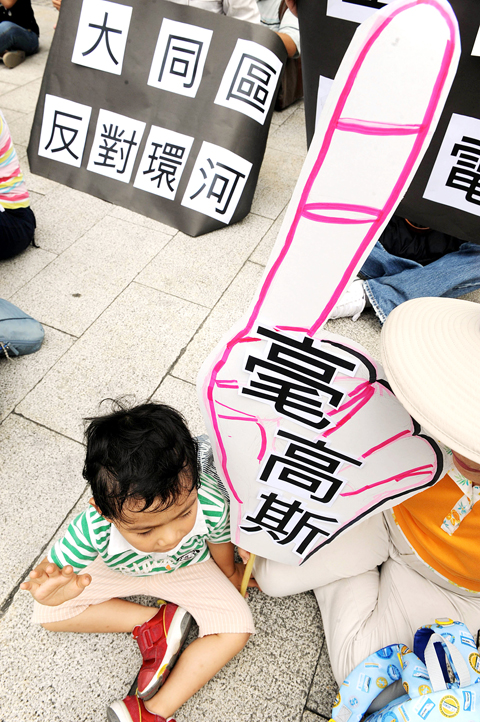Representatives of environmental groups gathered in front of the Environmental Protection Administration (EPA) yesterday to urge the government to lower electromagnetic wave safety standards to a maximum of 1 milli-Gauss (mG).
The agency is considering lowering electromagnetic wave safety standards by 10 percent for “sensitive regions” such as schools, hospitals and residential areas, but the activists said that was not enough.
Taiwan Electromagnetic Radiation Hazard Protection and Control Association chairwoman Chen Chiao-hwa (陳椒華) said the EPA was considering lowering the standard for sensitive areas from 833mG to 83.3mG.

PHOTO: CNA
“From WHO data, we know that advanced countries such as the US and Switzerland have an electromagnetic wave safety limit of 1mG. We fear that as Hsiao is on the EPA’s expert panel, his statement could cause a public misunderstanding,” she said.
She was referring to a recent remark by National Taiwan University of Science and Technology electric engineering assistant professor Hsiao Horng-Ching (蕭弘清) that even if an environment or location had an electromagnetic wave level of 8,300mG, there would be little harm to human health.
“Even at 83.3 milli-Gauss, people are still exposed to high health risks and are likely to develop chronic illnesses such as cancer, or give birth to children with mental retardation or other birth defects,” Chen said.
The environmental groups urged the government to follow the example set by other countries and set the nation’s safety limit to 1mG.
Air Quality Protection and Noise Control Director-General Hsieh Yen-ju (謝燕儒) said the EPA was not ready to decide on whether to lower the limit.
“To make sure we cover all the bases, we will hold more meetings with environmental groups, the National Communications Commission, the Department of Health and media representatives soon,” Hsieh said.
As for the debate over 1mG and 83.3mG standards, Hsieh said that since every country is different, the EPA would collect more information to determine what was best for Taiwan.

Taiwan is stepping up plans to create self-sufficient supply chains for combat drones and increase foreign orders from the US to counter China’s numerical superiority, a defense official said on Saturday. Commenting on condition of anonymity, the official said the nation’s armed forces are in agreement with US Admiral Samuel Paparo’s assessment that Taiwan’s military must be prepared to turn the nation’s waters into a “hellscape” for the Chinese People’s Liberation Army (PLA). Paparo, the commander of the US Indo-Pacific Command, reiterated the concept during a Congressional hearing in Washington on Wednesday. He first coined the term in a security conference last

Prosecutors today declined to say who was questioned regarding alleged forgery on petitions to recall Democratic Progressive Party (DPP) legislators, after Chinese-language media earlier reported that members of the Chinese Nationalist Party (KMT) Youth League were brought in for questioning. The Ministry of Justice Investigation Bureau confirmed that two people had been questioned, but did not disclose any further information about the ongoing investigation. KMT Youth League members Lee Hsiao-liang (李孝亮) and Liu Szu-yin (劉思吟) — who are leading the effort to recall DPP caucus chief executive Rosalia Wu (吳思瑤) and Legislator Wu Pei-yi (吳沛憶) — both posted on Facebook saying: “I

Sung Chien-liang (宋建樑), who led efforts to recall Democratic Progressive Party (DPP) Legislator Lee Kun-cheng (李坤城), was released on bail of NT$80,000 today amid outcry over his decision to wear a Nazi armband to questioning the night before. Sung arrived at the New Taipei District Prosecutors’ Office for questioning in a recall petition forgery case last night wearing a red armband bearing a swastika, carrying a copy of Adolf Hitler’s Mein Kampf and giving a Nazi salute. Sung left the building at 1:15am without the armband and covering the book with his coat. Lee said today that this is a serious

The Ministry of Economic Affairs has fined Taobao NT$1.2 million (US$36,912) for advertisements that exceed its approved business scope, requiring the Chinese e-commerce platform to make corrections in the first half of this year or its license may be revoked. Lawmakers have called for stricter enforcement of Chinese e-commerce platforms and measures to prevent China from laundering its goods through Taiwan in response to US President Donald Trump’s heavy tariffs on China. The Legislative Yuan’s Finance Committee met today to discuss policies to prevent China from dumping goods in Taiwan, inviting government agencies to report. Democratic Progressive Party Legislator Kuo Kuo-wen (郭國文) said